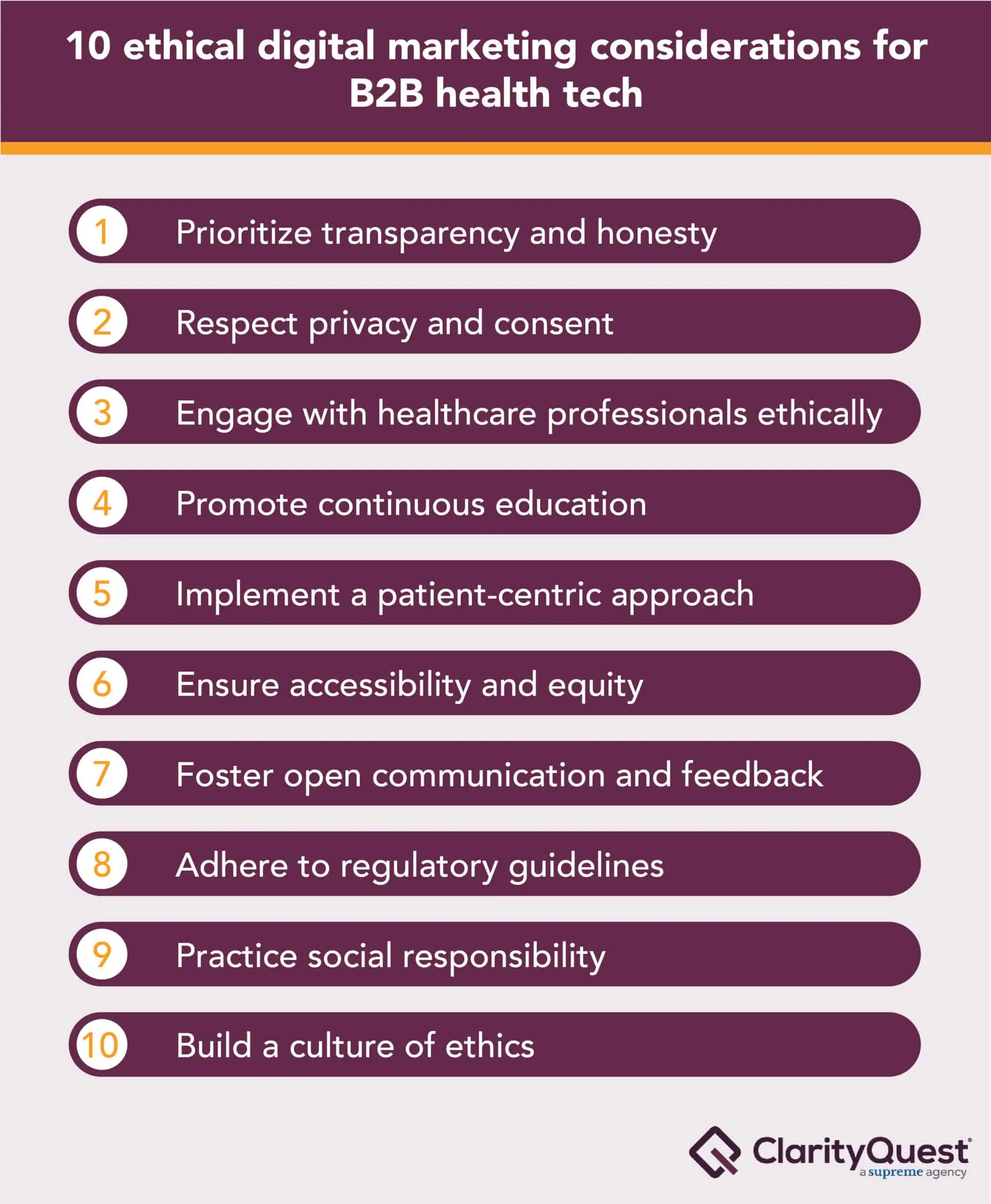The line between innovative digital marketing and ethical responsibility is often a fine one. Organizations operating in the B2B health tech sector face unique challenges and considerations regarding the ethical digital marketing of their products and services.
Not only must they navigate the complex regulatory environment designed to protect patient data and ensure product efficacy and safety, but they must also adhere to ethical standards that respect both the healthcare providers they serve and the end users impacted by their technologies.
Our healthcare tech marketing agency regularly explores the ethical implications of B2B health tech marketing. We’ve outlined our top 10 best practices for ethical digital marketing.
Understanding the ethical landscape
The health tech industry is governed by many regulations, including HIPAA in the United States, GDPR in Europe and other regional laws designed to protect patient information and ensure the safety and efficacy of health-related technologies.
These regulations set the baseline for ethical marketing practices, which include truthful representation of product capabilities, respecting patient privacy, and avoiding conflicts of interest.
However, ethical marketing in health tech goes beyond mere compliance. It encompasses a commitment to transparency, integrity, and putting the welfare of patients and healthcare providers first. This means not only highlighting the benefits of a product or service but also being upfront about limitations and potential risks.
Best practices for ethical digital marketing in B2B health tech
1. Prioritize transparency and honesty: Ensure all marketing materials are clear and accurate, and provide a balanced view of the product’s capabilities and limitations. Overselling or making unfounded claims can lead to mistrust and potentially harm patients who rely on these technologies for their health and well-being.
2. Respect privacy and consent: When using patient data or testimonials in digital marketing materials, obtain consent and ensure compliance with all relevant privacy laws. Be clear about how data is collected, used and protected within your marketing strategies to build trust with both B2B clients and the individuals whose data may be involved.
3. Engage with healthcare professionals ethically: Digital marketing efforts should aim to inform and educate healthcare professionals about the benefits and potential uses of a product or service, without attempting to influence prescribing behavior or treatment decisions unethically. Provide evidence-based information and support that helps them make informed decisions in the best interest of their patients.
4. Promote continuous education: The health tech field is constantly advancing. Offer ongoing educational opportunities for healthcare providers about new technologies, updates to existing products and best practices for implementation. This commitment to education supports the ethical use of technology in healthcare settings and ensures that patients receive the most current and effective care.
5. Implement a patient-centric approach: Design digital marketing strategies with the end user’s well-being in mind. This involves not only highlighting how technologies can improve patient outcomes but also considering the user experience, accessibility and potential barriers to effective use.
6. Ensure accessibility and equity: Be mindful of creating digital marketing materials and product offerings that are accessible to all potential users, including those with disabilities and those from diverse socioeconomic backgrounds. Health tech solutions should aim to reduce health disparities, not exacerbate them.
7. Foster open communication and feedback: Establish channels for feedback from B2B clients and end users. Listening to the experiences of those who interact with your technology on the front lines can provide valuable insights into improving products and marketing strategies ethically and effectively.
8. Adhere to regulatory guidelines: Stay informed about the latest regulations affecting health tech marketing and ensure all materials and strategies are in full compliance. This includes regulations related to advertising, patient privacy, and the marketing of medical devices and software.
9. Practice social responsibility: Consider the broader impact of your products and marketing strategies on public health and well-being. Engage in social responsibility initiatives that contribute positively to your communities, such as supporting public health campaigns or providing technology to underserved areas.
10. Build a culture of ethics: Fostering an organizational culture that prioritizes ethical considerations in all aspects of business operations is crucial. This culture should permeate every level of the organization, guiding decision-making and ensuring that ethical marketing practices are not just a policy but a core value.
Promote ethical digital marketing to ensure healthcare provider and patient trust
Navigating the ethical considerations of B2B health tech marketing requires a thoughtful approach that balances innovation with integrity. By adhering to these best practices, companies can comply with regulatory requirements and build trust with healthcare providers and patients, contributing to a healthier future for all.
As the health tech industry continues to grow and evolve, so too will the ethical frameworks that guide its marketing efforts, ensuring that advancements in technology go hand in hand with advancements in patient care and well-being.



